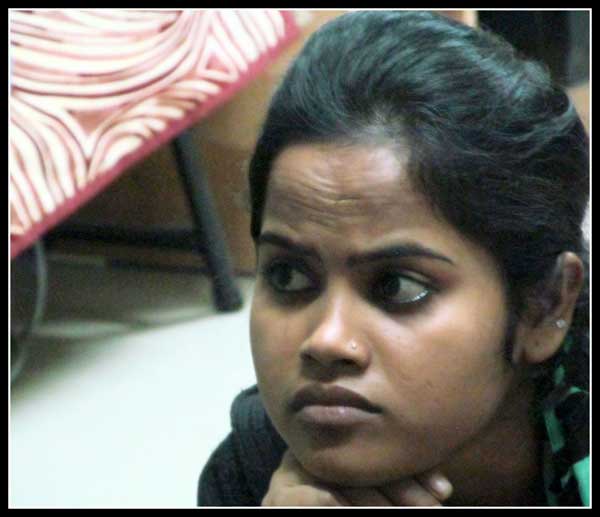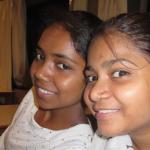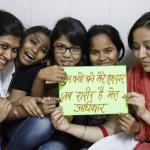Fighting for her right to education: the story of Durga
“The one struggle I face almost every single day of my life ever since I was in high school is that of facing the elders in my family (especially my father and brother), who are hell bent on getting me married. For everything that happens at home, for every single thing that I do and for everything that they deem as wrong, the answer and corrective measure for each one of them is the same: my marriage!”
This may be the story of someone you have never met, but the pressure and the struggle she describes is something many of us can relate to. Marriage seems to be the penultimate destiny of a woman, followed by bearing children (preferably male). The pursuit of education and having a career are encouraged as long as they do not impede with the prospect of marriage. In fact, if a woman does not marry within a specific age frame, concerned relatives and gossip mongering neighbours feel that it is their responsibility to remind the parents of the woman in question that they should get their daughter married!
While we consistently argue that an individual can exercise their autonomy and decide to adhere to singlehood for as long as they wish to, it cannot be denied that there is a stigma attached with unmarried individuals, women in particular. There is a propensity to delve into her personal traits and come to the conclusion that she must have shortcomings that have hindered her marriage. An unmarried woman is looked down upon as a social anomaly as she is a challenge and perhaps even a threat to the institution of marriage. Marriage is projected as the ultimate destination for women. It is romanticized to the extent that a woman starts believing that her life won’t come to a fuller circle without marriage.
Back when Durga was in her high school and had completed grade 11, she started receiving marriage proposals from relatives and friends of the family: a custom not very alien to her or many in our society. Her father insisted on her getting married right then but she recalls that she cried and fought, and did everything in her capacity to convince her parents against this idea. Somehow, and gratefully, she points out that the convincing worked. Durga went on to pursue her education from Dehradun while her parents and her elder brother lived in Delhi.
One fine evening in Dehradun, Durga went to attend a wedding ceremony with her friend where she ran into her maternal uncle (mama). Not to her surprise, that very evening, he called up her mother, pointing at how utterly disgusting and defying of noble values it was that Durga went for that wedding ceremony at night, since she is a girl. Women, according to her uncle (and many other orthodox-minded in our society), should not be allowed to step out of their house post sunset. “He asked all kinds of questions from ‘why is she out at night?’ to ‘who is she out with?,” and this, in turn, resulted in my father being dead set on bringing me back to Delhi and having me betrothed to whatever or whoever came through our doorsteps next!”, says Durga. To her dismay, her father forced her to move to Delhi and drop out of high school. She cried and fought and did everything she had always done before when the topic of marriage was brought up but she started feeling that she was failing at all her attempts. The one statement that was oft repeated in the house was “ladki bilkul bigad gayi hai aur haath se nikal gayi hai ab” (Our girl is completely spoiled and out of our hands now).
Durga tried to come to a common ground and began negotiating with her family. She decided that her education was way more important to her than her living away from her parents, so she asked them to permit her to study through correspondence education where all she would need to do is go to Dehradun just to appear in her examinations. This suggestion was dismissed as well as her father said that there was no money left for her education since they had just spent it all on her brother’s. This is yet another familiar way of gender discrimination that still happens in our society where investing in the education of the son is preferred over the education of the daughter. Daughters are commonly referred to as “paraya dhan”or else’s wealth. This, in turn, objectifies women and sees them as someone’s property. A woman is considered to be her father’s possession before marriage and her husband’s possession after marriage. Clearly, Durga’s father wanted Durga to be someone else’s headache and concern to look after, and therefore marriage was the best solution in his mind.
Meanwhile, Durga had started coming to FAT to learn how computers are operated and that is when she heard of a vacancy for the post of an office intern in the organization. She had no idea what an intern’s job was but she was in need of money to fund her own education. Once she got the job, she started saving up for her education because she was determined to not give up. After she had saved up a considerable amount for her education, she once again approached her parents to re-start the discussion on her education.
In the interim, Durga kept receiving marriage proposals that she vehemently kept denying. At FAT, she had begun to learn more about women’s rights and how crucial it was for her to stand up for them, even if that meant that she needed to do so inside the confined walls of her own house. When her father used the same old excuse that there was no money to spend on her education, Durga presented to him her hard earned savings. After a lot of persuasion, both her parents agreed that she would stay in Delhi and complete her schooling through correspondence where she would only go to Dehradun to appear for her exams. She was also given another condition that once her schooling was over, she had to accept a proposal and get married. Durga agreed upon the former condition as her education was her primary concern.
Durga has now successfully completed her schooling. In fact, her results were declared a few days back and she couldn’t be happier that she passed, despite all the stress she continues to face at home. “I will now apply for my B.A course because education is something I would pick for myself over marriage, any day! My elder brother has become the devil’s pawn now and doesn’t fail to remind me how useless it is for a woman to study further and how I should just embrace my destiny and get married. I’ve decided that I will not care anymore. Because educated is the kind of woman I wish to be”, smiles a resilient Durga.
FAT has begun its work on the fight against early and forced marriage (EFM) by training young girls on photography and filmmaking so they can shoot and produce a film highlighting the pressure to get married. To know more about this and contribute to the collective fight, click here.
- Durga Vishwas is an office intern at FAT who helps us with our admin work, apart from attending classes at the Tech Center and being actively engaged in FAT girls' EFM project Manisha Massey is a graduate in psychology from Delhi University who interned with FAT from January-May, 2015




